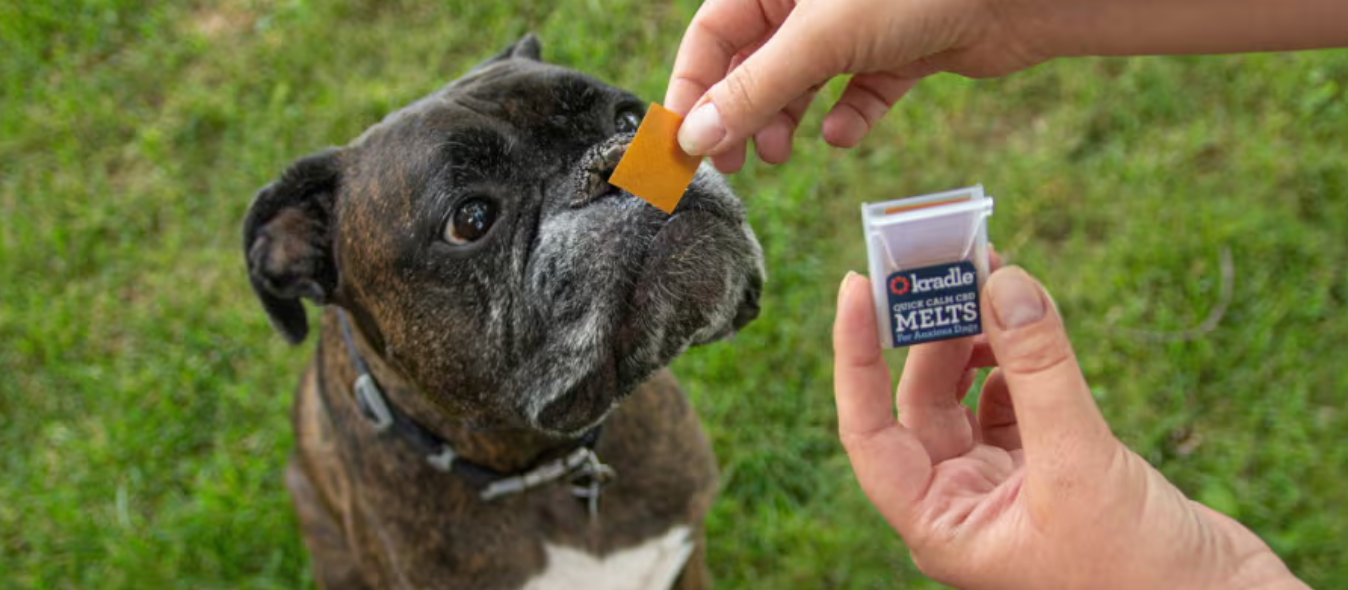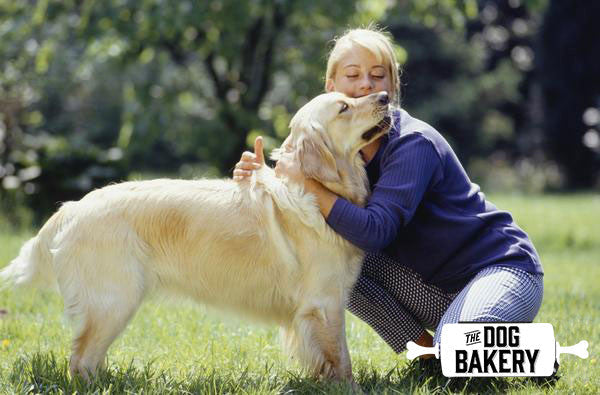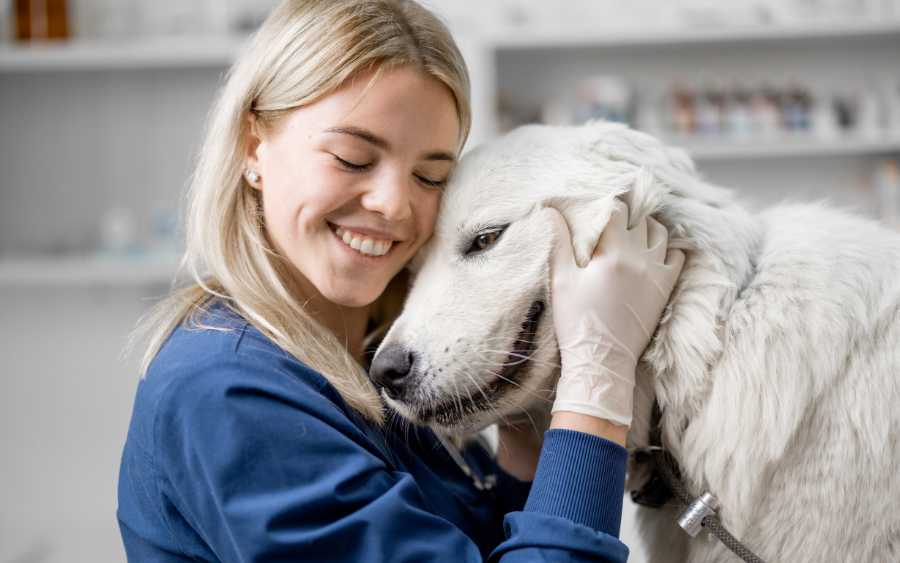
We know it's hard to leave your dog and go to work everyday. Many of us would rather stay home with our best friend all day if we could, wouldn't we? But it's an unfortunate fact that many of us simply can't afford to do that. And we know it's not just hard on you, but it can be hard on your best friend too. Especially if there's a change in routine or you have a new dog in your life who's not yet comfortable without you nearby.
When I first got Annabelle, my Great Dane, she was 8 weeks old. I had just completed graduate school and was trying to find work, so I was able to stay home with her all day, every day. Since it was during the recession, it meant this went on for a very long time. Annabelle got used to me being there with her. And honestly, I got used to it too.
When I took my first post-grad school job, I knew it wouldn't be easy. She was already crate trained, but I didn't want to crate her for eight hours a day, so we blocked off the kitchen and dining area for her instead. She had access to toys, her bed, everything she needed to be comfortable and secure. But even though she had everything she could possibly need, she was still missing one thing – me.

Because we didn't transition her properly to ease her anxiety, she wound up tearing up the kitchen. Being that she's a giant dog, she has a giant mouth and her ability to devour furniture knows no bounds. She ate my kitchen table, my chairs, even the railing to the stairs leading to the back door. She pulled up the flooring at the door and managed to open all of the cabinets and eat everything she found in there as well.
All of this in one eight hour day. Back then, I knew less about dogs than I do know, and it was extremely stressful. I didn't know that Annabelle was stressed out and missing me. She was going through something very normal for a dog when their human leaves them alone for the first time. She was experiencing separation anxiety.
This is a very common problem for dogs. Like I mentioned above, it can stem from a change in routine or it could be a problem from the very first day you bring your canine friend home. Many dogs that are rescued might fear that when you leave, you're never coming back. After all, they've likely been abandoned before and are fearful of it happening again.
The question is, how do you help your dog overcome separation anxiety once and for all?
The first step is to identify the type and cause of the anxiety and behavior. Some dogs are genuinely stressed out and act out, while others may do it because it's a learned behavior that's inadvertently reinforced through our own actions. Also, sometimes it's not the stress of being alone that's the problem, but boredom. Many dogs simply do not get enough exercise and fulfillment due to our busy schedules, and this can also lead them to being destructive when you're away.
As much as we try to do what's best for our dogs, sometimes it's our own actions causing the anxiety.
Here are five ways we can increase anxiety in our dogs:
1) When we leave, we make a big deal out of saying goodbye. We make this seem like a sad time with hugs, kisses and encouraging words, hoping that this will soothe our dog before we leave.
2) When we return, we make a big deal out of coming home. Our dogs greet us with such exuberance, and it feels good! So we love on them and praise them over and over again.
3) We don't give our dogs enough exercise prior to leaving them.
4) We don't provide enough enrichment to keep them entertained while we're away.
5) We don't properly prepare them to be alone.
The first two are likely the most common issues. When you leave, you try to soothe your dog, but what you're essentially doing is ramping up their anxiety. They now know you're leaving, and because you've comforted them, they assume this is a big, scary time. They begin to associate you leaving with something that is sad or scary. And when you come home and they get super excited, and you in turn get super excited. By doing that, you're telling them that you leaving is bad, and you coming home is good. Which leads to anxiety while you're gone.
Also, many dogs act out because they're bored. We often forget that many breeds were bred for specific purposes. Huskies may be beautiful to look at, but they are built to pull sleds through the snow. Sitting on a couch all day while you're at work is the equivalent of you watching paint dry for several hours a day, every day, for the rest of your life.
No matter the reason, it boils down to your dog not being prepared for being left alone. So how can you work on separation anxiety and make sure your dog doesn't eat your house when you leave for a few hours? How can you make sure your dog is comfortable, safe and secure while you're at work?
Here are 8 tips that will hopefully help you and your pet work on these issues
1) Vet knows best. Especially if this is a new issue or you're dealing with an older dog, it doesn't hurt to check with your vet to make sure there aren't underlying medical issues that are leading to the anxiety. Sometimes they can also prescribe medicine to help with the anxiety, but usually it's best to work on training or other natural means before turning to medicinal cures. There are also essential oils that could help curb their anxiety, but again, check with your vet first.
2) Stop turning your departure into something bad. Yes, we like that our dogs miss us and don't want us to leave, but that mentality isn't good for your dog. The best way to fix this issue is to turn you leaving into a positive experience. Don't make your goodbyes into an emotional affair, for one thing. Be calm and happy as you prepare to leave. But also give your dog something to look forward to when you leave. For instance, have specific toys that only come out when you leave. Or feed them when you leave. If you don't want to give them an entire meal, you can give them special treats that are only given right before you head out the door. It's best if these items last awhile, giving them something to do for awhile after you step out. Which leads us to our next solution...
3) Find news ways to keep them entertained while you're away. There are puzzle toys that dispense treats when your dog does certain tasks. Not only do they get a yummy treat, it keeps them busy. And for dogs that need mental stimulation and who are bored, it provides that as well. You can also fill up a Kong toy with peanut butter and freeze it, giving them a tasty treat they can savor for a while. Not only that, it keeps them busy, which in turn, keeps their mouths off of your shoes and electronics or whatever may be handy. It's a win-win for everyone.
4) Take baby steps. If your dog suffers from severe separation anxiety, you may need to start slow. This means instead of leaving your dog for eight hours by themselves, you start out by leaving them for a few minutes as you walk down the street. Then gradually increase the time you're away, letting them realize that nothing bad happens when you're gone.
5) Hellos and goodbyes need to be calm. When you leave, don't make a big deal out of it. Same when you return. It's just another part of your day. The less you react to these events, the less emotion your dog will attach to them as well. You may pet your dog upon entering, but remain calm and don't get overly excited. This way they don't associate your absence with any strong emotions.
6) Do not punish your dog. I can't state this enough, if you want your dog to be well-behaved and well-adjusted, you need to be careful in how you train them. Scolding, yelling or spanking, especially a dog that is already anxious, will only increase their anxiety. Sure, it's frustrating when you come home and see your entire shoe collection torn to shreds, but at the end of the day, you should have made sure anything of value was put away until you know your dog can be trusted. If anyone deserves the scolding, it's you. But even when you check and double check, accidents happen. And that's fine. Just don't take that frustration out on your dog because it doesn't fix the situation. It only makes it worse.
 7) Exercise your dog. Depending on the breed, this may mean going on a four mile run or simply tossing the ball in the backyard. This is why it's important to consider the energy level of a breed before getting a dog and making sure you get a breed that's right for you. If your dog is full of energy and you leave them confined to your house all day with no release, then you're just asking for trouble. Exercise is key. Wear your dog out before work and they just might sleep the entire day away, oblivious to you being gone at all.
7) Exercise your dog. Depending on the breed, this may mean going on a four mile run or simply tossing the ball in the backyard. This is why it's important to consider the energy level of a breed before getting a dog and making sure you get a breed that's right for you. If your dog is full of energy and you leave them confined to your house all day with no release, then you're just asking for trouble. Exercise is key. Wear your dog out before work and they just might sleep the entire day away, oblivious to you being gone at all.
8) Crate train. Not every dog needs to be crate trained, but it can always come in handy. Annabelle was crate trained from the very beginning, and it was a breeze. To this day, she chooses to lie in her crate or other tight space (now that her crate isn't up) when she's nervous or wants to be left alone (because our cats like to pester her). Because she's severely stressed when I leave, she put herself in harm's way by chewing. I established her crate as her safe place, and to this day, it remains so.
We are just now working on leaving her out of the crate when we leave. She's now showing progress. But she still prefers to lie in her crate, even if the door isn't shut, because it helps her feel contained. And that's fine. She's very much a dog of routine. When she knows what to expect, she's not stressed. And for her, going into the crate usually means tons of treats, something she looks forward to every day. It alleviates the stress of us leaving her.
We can't stress enough about how great puzzle toys and Kongs filled with Peanut butter can be though. It's a great investment that can save you a lot on furniture and vet bills. Because let’s face it, dogs who eat the house are at a greater risk for obstructions and getting into toxic items. Give them something they can chew on instead. Something safe. Something healthy. And best of all, something yummy.






